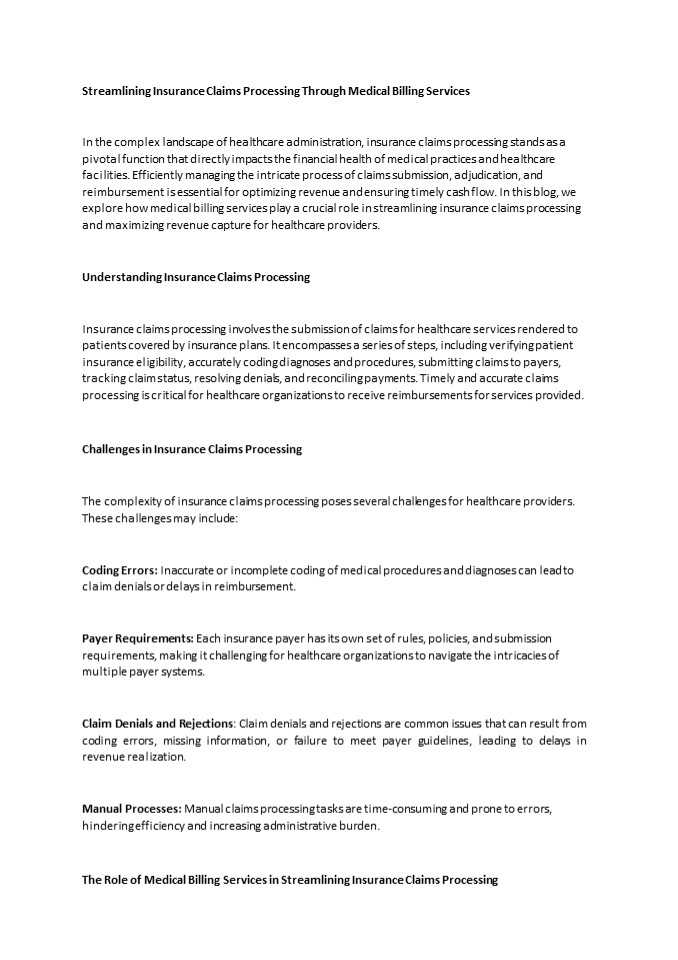Streamlining Insurance Claims Processing Through Medical Billing Services
Title:
Streamlining Insurance Claims Processing Through Medical Billing Services
Description:
Medical billing services specialize in optimizing insurance claims processing for healthcare providers. By ensuring accurate coding, navigating payer requirements, and employing efficient denial management strategies, these services streamline the claims submission process, minimize errors, and accelerate reimbursement timelines, ultimately maximizing revenue capture for medical practices. –
Number of Views:0
Title: Streamlining Insurance Claims Processing Through Medical Billing Services
1
Streamlining Insurance Claims Processing Through
Medical Billing Services In the complex
landscape of healthcare administration, insurance
claims processing stands as a pivotal function
that directly impacts the financial health of
medical practices and healthcare facilities.
Efficiently managing the intricate process of
claims submission, adjudication, and
reimbursement is essential for optimizing revenue
and ensuring timely cash flow. In this blog, we
explore how medical billing services play a
crucial role in streamlining insurance claims
processing and maximizing revenue capture for
healthcare providers. Understanding Insurance
Claims Processing Insurance claims processing
involves the submission of claims for healthcare
services rendered to patients covered by
insurance plans. It encompasses a series of
steps, including verifying patient insurance
eligibility, accurately coding diagnoses and
procedures, submitting claims to payers, tracking
claim status, resolving denials, and reconciling
payments. Timely and accurate claims processing
is critical for healthcare organizations to
receive reimbursements for services
provided. Challenges in Insurance Claims
Processing The complexity of insurance claims
processing poses several challenges for
healthcare providers. These challenges may
include Coding Errors Inaccurate or
incomplete coding of medical procedures and
diagnoses can lead to claim denials or delays in
reimbursement. Payer Requirements Each
insurance payer has its own set of rules,
policies, and submission requirements, making it
challenging for healthcare organizations to
navigate the intricacies of multiple payer
systems. Claim Denials and Rejections Claim
denials and rejections are common issues that can
result from coding errors, missing information,
or failure to meet payer guidelines, leading to
delays in revenue realization. Manual
Processes Manual claims processing tasks are
time-consuming and prone to errors, hindering
efficiency and increasing administrative
burden. The Role of Medical Billing Services in
Streamlining Insurance Claims Processing
2
Medical billing services play a pivotal role in
streamlining insurance claims processing and
overcoming the challenges associated with manual
processing. Here's how medical billing services
contribute to optimizing this crucial
function Expertise in Coding and Billing
Medical billing services employ skilled
professionals who are proficient in medical
coding and billing regulations. They ensure
accurate coding of procedures and diagnoses,
minimizing coding errors and reducing the risk of
claim denials. Payer Compliance Medical
billing services stay updated with payer
requirements and guidelines, ensuring that claims
are submitted in compliance with payer
specifications. They navigate the complexities of
multiple payer systems, streamlining the claims
submission process for healthcare
providers. Automation and Technology
Leveraging advanced technology and billing
software, medical billing services automate
repetitive tasks, such as claims submission and
follow-up, accelerating the processing timeline
and improving efficiency. Denial Management
Medical billing services employ proactive denial
management strategies to identify and address
claim denials promptly. They analyze denial
patterns, appeal denials, and resolve issues to
expedite reimbursement and maximize revenue
capture. Conclusion In conclusion, medical
billing services play a critical role in
streamlining insurance claims processing for
healthcare organizations. By leveraging their
expertise in coding, payer compliance, and denial
management, medical billing services help
optimize revenue capture, minimize claim denials,
and accelerate reimbursement timelines. As
healthcare providers navigate the complexities of
insurance reimbursement, partnering with a
reputable medical billing service can prove
invaluable in achieving financial stability and
success.































